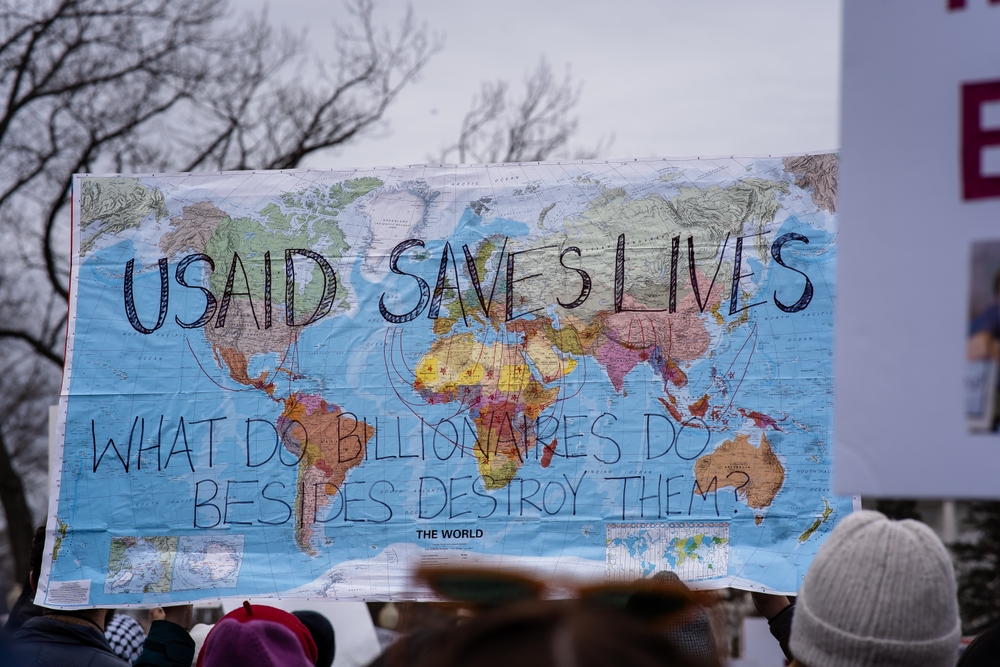The harm reduction world is still reeling from the after-shocks of the global health disruption caused by the Trump regime’s defunding of USAID, PEPFAR and related aid programmes that were lifelines for so many non-governmental organisations worldwide. This already-dire crisis is already dire risks turning into a human catastrophe unless organisations move to secure new funding that ensures their and their community’s survival.
A world in crisis
The exact picture of the impact of the defunding of USAID and related funding mechanisms is still unclear. This is partly because some USAID programmes will continue operating until their contracted end; related funding mechanisms like PEPFAR are gone, and others, like the Global fund, the Robert Carr Fund and Open Society Foundation will have to adjust to fill the gaps left by the US. Many organisations were also indirectly receiving American funding, meaning impact will only be understood later on. More clarity is expected towards the end of the year as programmes wind down operations and re-assess their funding situation.
Within the drug and harm reduction world, American defunding has critically impacted the work of many organisations. The International Network of People Who Use Drugs (INPUD) published in late April a rapid assessment, surveying around 100 community-led harm reduction organisations and networks of people who use drugs from primarily low- and middle-income countries.
Their research highlighted that most organisations would struggle to fund outreach and peer-led services, HIV testing and other key services for those using drugs; around a fifth of respondents received 76 – 100% of their funding from the US government, meaning a complete end to their work unless emergency funding is secured. Many reacted to the funding cuts by suspending outreach work, reducing service hours or simply closing services. Respondents also added that service disruption will also lead to increased discrimination around drug use, particularly in countries with more repressive approaches towards drug use who fail to fund services that protect the health and wellbeing of people using drugs. As one respondent put it to INPUD, “the USAID stop order is killing people who depend on our services.”
Harm Reduction International (HRI) has noted that there was already a massive funding gap within the harm reduction world even before USAID defunding. Catherine Cook, HRI’s Acting Director, recently told Drug Reporter that USAID defunding was “worse than a crisis, it’s a catastrophe for harm reduction funding.” From Cook’s perspective, funding loss will likely impact Opioid Substitution Therapy (OST) provision worldwide, as well as outreach workers who play a key role in building relations and protecting the health of more marginalised groups. HRI’s analysis of the aid landscape post-American defunding also highlighted how much it would impact drug-related services, particularly HIV treatment and OST provision.
Both INPUD and Cook called for national governments to step up their contributions to fill this funding gap, and for drug user networks to increase their advocacy efforts to ensure their populations are not left behind in the scramble for money and importance. However, in a world where drug use continues to be criminalised, convincing punitive nations to prioritise the rights of people who use drugs may prove to be a challenge.
A slow burning crisis/ long time in the making
The sudden USAID funding cuts have exposed just how precarious the funding models of most NGOs are . This is an issue that has been highlighted for almost 30 years; within this period, many NGOs have become primarily reliant on grants from government-led aid agencies or funding from international philanthropic organisations. This dependency varies across regions, however there’s significant evidence that African NGOs are considerably more reliant on international funding. Most funding also comes from public bodies: OECD data from 2024 shows that only 5% of foreign aid comes from private philanthropic institutions; the rest comes from government or public bodies.
This narrow funding model has left NGOs and the life-saving work they do vulnerable to geopolitical games and external changes entirely out of their control. As we have seen with the US, which is estimated to have provided more than 40% of all global aid in 2024, changes in one funder nations’ political priorities can have brutal consequences for the world. This problem is amplified when other traditional international funding nations like the Netherlands, Germany, and others are rolling back their aid contributions, and the knock-on effect can be fatal for NGOs with grant-dependent funding. While some have reduced their financing risks by diversifying the number of grants they receive, a high level of foreign aid dependency is a precarious funding model.

What may be the new reality?
While nobody could have predicted the brutal end to aid brought about by the Trump regime, this is a tragic and deadly disruption to the civil society funding system. It’s also a call for change.
Some have chosen to frame this funding disruption not as a moment of despair, but of painful, yet needed, liberation. Olusoji Adeyi, President of Resilient Health Systems, has highlighted an African “awakening” post-American defunding, noting Ghanaian and Nigerian policymakers already developing legislation to address health funding gaps left by the US. He suggested that, in order to end African over-reliance on aid, funding gaps must be met with national and regional responses, strong civil society advocacy for more local funding, as well as sunset clauses on existing foreign aid programmes to prevent an unending relationship of influence. What Adeyi touches on is the importance of countries rebuilding the autonomy of critical health infrastructure, as well as organisations’ gaining independence from international aid.
DeJusticia, a Colombian legal and social NGO, framed USAID as a tool used by the American state to keep Latin American states and civil society dependent on their capital and influence. Similarly to Adeyi, they see defunding as an opportunity for Global South nations to “rethink more horizontal international cooperation relations”, both between states and between civil society organisations. In practice, this means improving tax collection systems to raise funds for public initiatives, and build the capacity of organisations to fill in the gaps. In short, the Global South shouldn’t wait for another international funder to “save” them; instead, it should step up to the task of protecting its own people.
What can NGOs do?
While countries rebuild their own systems, NGOs also need to adapt their funding models and human resources. IARAN, an organisation training workers and analysing the international humanitarian landscape, published in 2017 a report entitled “Future of Aid: 2030”. This document hypothesised several different geopolitical scenarios, highlighting the challenges they will bring and the strategies that international NGOs should take to ensure their survival.
Speaking to TalkingDrugs, Michel Maietta, one of IARAN’s co-founders, provided a sobering analysis of the NGO funding landscape, and said that organisational and sector shrinking is tragically inevitable due to the over-reliance on institutional funding. NGOs have also prioritised developing in their workforce talented grant writers, managers and fundraisers, usually neglecting the need to invest time and (human) resources into other revenue-generating activities.
“Unfortunately, we need to face the fact that people haven’t prepared themselves for the future,” he said.
Maietta stressed that, to ensure their existence and ability to continue serving their populations, civil society organisations now need to kick into survival mode: this means shrinking their operations to fit their existing funding capacity, identify existing organisational value, develop their workforces into new value areas, and radically diversify their financing streams if they are to weather this storm.
While IARAN’s work is focused on international NGOs, his takeaways are applicable to national organisations. He calls for organisations, particularly those entirely dependent on fundraising models, to use the next five years to re-evaluate their targets, including building a workforce that can help achieve a new level of self-generated income that can guarantee the organisation’s future (Maietta suggested at least 50% of an organisation’s income should be self-generated).
Map new values and pivot
To reach this goal, Maietta spoke of a “pedagogical effort” needed within NGOs, where its leaders and entire communities need to gather and map out what value they are already creating through their work that they are not capturing or transforming into a potential revenue stream.
“A lot of organizations do fantastic jobs. They create impact, but they create value beyond the mission that they have. And this value can sometimes be sold… For example, some organizations create value in trainings, or they create values in creating knowledge. Some of them even do research. And when you do research on specific topics, eventually you can actually create intellectual property,” he explained.
People within organisations, Maietta added, “create values beyond your mission, and you need to map those values, you need to identify and understand if there is something that could be actually transformed quite immediately into a business. It could be intellectual property. It could be actually providing services. It could even be goods that you are creating. It really depends on who you are”.
Maietta recommends piloting different income streams with the objective that, within five years, they could be scaled to become an income generating activity. To do this, capacity, time, and investment is needed; but this focus on diversifying income should be a priority as it could guarantee the organisation’s survival.
Go underground
For those organisations working with criminalised groups (like people who use drugs), Maietta recognised that changing political landscapes and attacks on civil liberties means groups should prepare to go underground, “because this might be the only way actually to protect and defend those minority groups”.
For those operating in highly criminalised contexts, he suggested creating hollow organisations that, on the surface, do not appear to be doing radical work, like protecting people who use drugs. This “duplicity”, Maietta said, will allow organisations to move without being targeted in political environments of rising nationalism, increased security concerns (rather than human rights) and the abandonment of marginalised communities.
Working underground can present new opportunities. International networks can collect international funds for and raise voices of organisations working in criminalised environments, avoiding detection of “foreign influence” as seen in some Eastern European countries.
Positively exploit inequalities
To ensure survival, organisations need to be pragmatic. This may mean taking on “ethical risk” by exploring alternative funding streams; this potentially looks like expanding the groups you get money from without crossing your fundamental ethical limits.
Maietta mentioned how donations can be transformed into more global income streams, especially if they stem from richer parts of the world. He spoke of one Global South organisation receiving a legacy donation of a single bedroom apartment in a Global North nation. In an effort to diversify the Southern organisation’s income stream, Maietta was helping them legally operate out of a Global North nation, developing their skills and connections to properly manage the property, and channel funds made from renting out the apartment to sustain operations in the South. Ensuring that their ethical boundaries are maintained would mean using these examples in ways that are not unnecessarily further stressing housing availability in the Northern nation.
“If we are able to create systems that generate revenues – and passive revenues – in the richest and western [states], and actually revert that money in those countries that are actually the poorest ones, the power of that money is huge,” Maietta said.
A critical time of action
Reducing international aid dependency will become critical in a world where global support systems are increasingly fragile. Countries need to re-establish their self-determination, either through effective systems of taxation or national funding of NGOs working in key health areas like BBVs. This has worked in the past: specific taxes have been created to fund HIV treatment, and rebuild their own health-based autonomy.
NGOs, in turn, will need to become dynamic and pragmatic, shaking off some of their past dependencies and making sure that their core financing is not dependent on a stream that, if gone, could be fatal. Proving their worth at a local, national and/or regional level will become increasingly important to ensure they stay around to keep working with and for the communities they represent in the first place.


